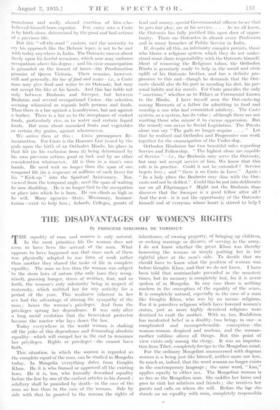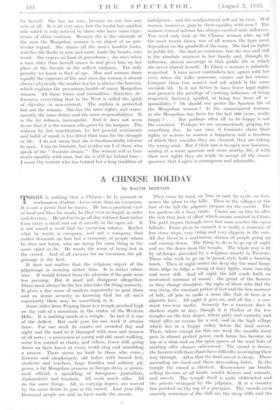THE DISADVANTAGES OF WOMEN'S RIGHTS
By PRINCESS NIRGIDMA DE TORHOUT THE equality of man and woman is only natural. In the most primitive life the woman does not seem to have been the servant of the man. What appears to have happened was that since each of them was physically adapted to one form of. work rather than another they shared the tasks of life in complete equality. The man no less than the woman was subject to the stern laws of nature (the only laws they recog- nized), gnawing hunger, stress of weather, fear, and so forth, the woman's only inferiority being in respect of maternity, which unfitted her for any activity for a period of the year. This weakness inherent in her sex had the advantage of stirring the sympathy of the man ; hence the woman's privileges. And from the privileges sprang her dependence. It was only after a long social. evolution that the benevolent protector became the master who lays down the law.
Today everywhere in the world woman is shaking off the yoke of this dependence and demanding absolute equality—which will compel. her in the end to renounce her priyileges. Rights or privileges—she cannot have both.
This situation, in which the woman is regarded as the complete equal of the man, can be studied in Mongolia today. In Mongolia everything dates from Genghis Khan. He it is who framed or approved all the existing laws. He it is, too, who formally described equality before the law by One of the earliest articles in his Jassak ; adultery shall be punished. by death—in the ease of the man no less than in the case of the woman. Side by side with that he granted to the woman the rights of inheritance, of owning property, of bringing up children, or seeking marriage or divorce, of serving in the army. I do not know whether the great Khan was thereby honouring the woman or simply putting her in her rightful place at the man's side. To decide that we should have to know what the position of woman was before Genghis Khan, and that we do not know. 1 have been told that matriarchate prevailed in the remotest times, but its memory is completely lost, for it is never spoken of in Mongolia. In any case there is nothing modern in the conception of the equality of the sexes. It is completely natural, especially in the case of a man like Genghis Khan, who was by no, means religious. For it is primitive religions which have lowered women's status, just as more highly deVolved religions were destined to exalt the mother. With us, too, Buddhism has inculcated belief in a duality, two beings in one—a complicated and incomprehensible conceptionthe woman-woman despised and unclean, and the woman- mother sublime above all things. But this point. of view exists only among the clergy. It was an importa- tion from Tibet, completely foreign to the Mongolian mind.
For the ordinary Mongolian unconcerned with dogmas. woman is a being just like himself, neither more nor less. So much so, indeed, that the word woman no longer exists in the contemporary language ; the same word, " kun," applies equally to either sex. The Mongolian woman is as free as the Mongolian man. She saddles her horse and goes to visit her relatives and friends ; she receives her guests and calls on whom she will. Before the law/ she stands on an equality with man, completely responsible for herself. She has no vote, because no one has any vote at all. It is all very nice, but the medal has another side which is only noticed by those who have some expe- rience of other customs. Because she is the comrade of the man the Mongolian woman is an object of no par- ticular regard. She shares all the men's hardest tasks, watches the flocks in rain and snow, loads the beasts, cuts wood. She enjoys no kind of precedence ; she rises when a man older than herself comes in and gives him up her :place at the fireside or the softest cushions. The only priority we know is that of age. Man and woman share equally the expenses of life, and since the woman is almost always physically the weaker her lot is always the heavier, which explains the precarious health of many Mongolian women. All those forms and formalities—flatteries, de- lerences, everything that in the West is called the spirit of chivalry—is non-existent. The orphan is protected but not the woman. She has the same rights, and conse- quently the same duties and the same responsibilities. It is the lex talionis, inescapable. And it does not seem to me that it is the woman who gains by the bargain. The woman by her constitution, by her general sentiments and habit of mind, is less fitted than man for the struggle of life. I do not mean that she is fundamentally inferior to man. I am no feminist, but neither am I of those who speak of the " feminist utopia." The woman will in time reach equality with man, but she is still far behind him- 1 mean the woman who has behind her a long tradition of indulgence ; and the readjustment will not be easy. Will women, moreover, gain by their equality with men ? The woman termed inferior has always exerted wide influence. You need only look at the Chinese woman who, up till the most recent times, was of all women the type most dependent on the goodwill of the man. She had no rights in public life. She had no existence, but she was and still is the absolute mistress in her family and, through its influence, almost sovereign in that public life in which she never shared herself. In China a woman is infinitely respected. A man never contradicts her, agrees with her even when she talks nonsense, carries out her whims. Compare these two women and ask which is the more enviable lot. Is it not better to have fewer legal rights and preserve the privilege of exerting influence, of being respected, flattered, spoiled, of being free from all re- sponsibility ? Or should one prefer the Spartan life of the Mongolian women ? Is the emancipated woman, as the Mongolian has been for the last 600 years, really happy ? . . . But perhaps after all to be happy is not the essential. Perhaps we are unconsciously groping for something else. In any case, if feminists claim their rights to restore to women a happiness and a freedom of which they consider they are cheated, they are taking the wrong road. But if their aim is to open new horizons, aiming at a more spacious and more worthy life, if with their new rights they are ready to accept all the conse- quences, that I agree is courageous and admirable.







































 Previous page
Previous page